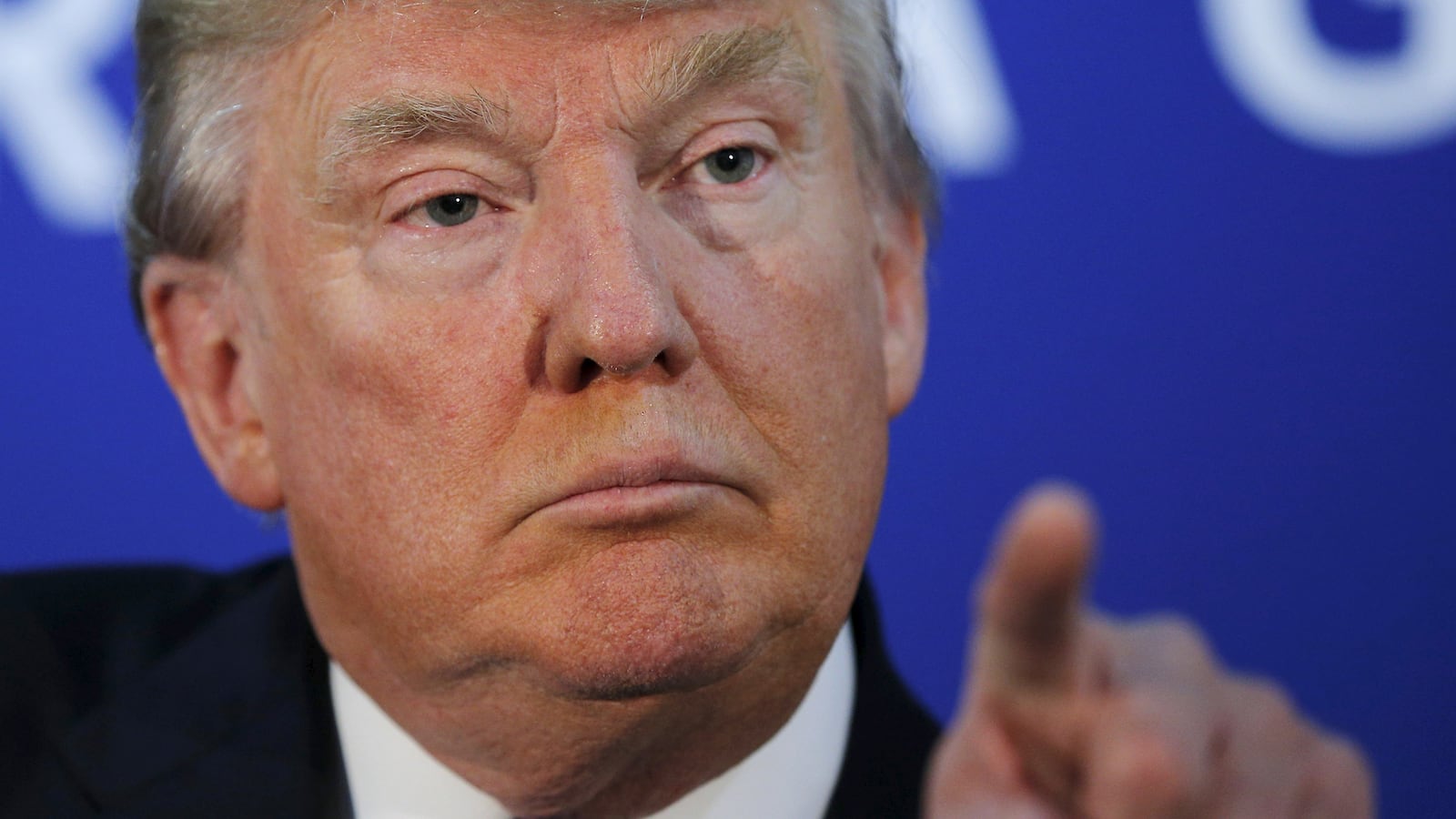Donald Trump and Ben Carson have spent the last 24 hours under fire after being accused of proposing bigoted and constitutionally questionable methods for keeping tabs on Muslims and Syrian refugees. And that’s causing some retired generals and admirals to speak out against the GOP presidential frontrunners.
The former top military officers contacted by The Daily Beast said not only are Carson and Trump pushing ideas that are unworkable, they would actually make the situation in Middle East worse.
For example, Retired Rear Admiral John Hutson, the former Judge Advocate General of the Navy, said Trump “has proven himself useful in defining the outer limits of the spectrum of thought” and that his ideas were “short of internment camps, but not much.”
“As a lawyer, I’d suggest that among other reasons it is a bad idea is that it violates the freedom of religion clause of the 1st Amendment,” Hutson said. “Victory for the bad guys is to cause us to change what we stand for in fundamental ways. This would do that.”
In a campaign appearance on Thursday, Trump said he would “absolutely” implement a mandatory database system to track Muslims, if elected to the Oval Office. And in an interview with Yahoo that same day, Trump refused to rule out forcing Muslims to carry an identification card identifying their faith. It should be noted, however, that he did not openly advocate for doing so in that interview.
“We’re going to have to do things that we never did before. And some people are going to be upset about it, but I think that now everybody is feeling that security is going to rule,” Trump said. “And so we’re going to have to do certain things that were frankly unthinkable a year ago.”
The comments came as Congress passed a controversial bill to stem the flow of Syrian refugees into the U.S. in response to terrorist attacks in Paris last week. It’s a measure that the last two Homeland Security Secretaries
Trump, on Friday, denied he had suggested a Muslim database. But Charles Dunlap, a retired Air Force major general and now a law professor at Duke, expressed puzzlement as to how registration of anyone by religion would add to national security in any way.
“Focusing on religion can be, from a military perspective, counterproductive, as it could serve to incite opposition where they may be none,” he said.
Chris Inglis, a retired Air National Guard brigadier general and former deputy director of the National Security Agency, seemed at a loss with Trump’s latest salvo.
“I have no particular insights on what Mr. Trump might have meant by his remarks but the law is clear,” he said. “Persons residing in the U.S. are afforded the same protection under the law as U.S. citizens, to include freedom from arbitrary interference with their privacy, freedoms of expression, association, and peaceful assembly, and the requirement of a court’s probable cause finding to conduct non-consensual government surveillance of the content of a given person's communications.”
But since this is the 2015 presidential race, Trump was—of course—not alone on the issue of Muslims and Syrian refugees.
Carson, during a campaign stop in Mobile, Alabama, compared some refugees fleeing certain death and persecution in Syria to “a rabid dog.”
“If there’s a rabid dog running around your neighborhood, you’re probably not going to assume something good about that dog and you’re probably going to put your children out of the way,” he said, adding later he would call the Humane Society to get the rabid dog help because he loves dogs.
How nice.
Hutson called the analogy “particularly unhelpful for a whole host of reasons.”
Several of the officials said the this type of language is not only counter to the American values, it actually feeds the ISIS propaganda machine.
Retired Army Lieutenant General Charley Otstott called the remarks “extremely inappropriate.”
“Equating refugees to terrorists seeks to exploit the fears of the American public and plays into the hands of Daesh, who want us to be very afraid,” he said, using an alternate term for ISIS. “We should be countering Daesh propaganda rather than taking actions which will most certainly feed their propaganda machine.”
Dunlap, the retired Air Force major general, urged the candidates to resist playing into the hateful rhetoric.
“I would hope that all candidates for public office would refrain from making derogatory characterizations of Syrian refugees, and instead focus on solving the problem,” he said. “If people want to use really negative language, we’ve got ISIS out there for that.”
And yet, the harsh words—and harsh proposals—seem to be only multiplying. In an interview with Fox News, Sen. Marco Rubio, considered by many Republican insiders to be the sane alternative to Trump and Carson’s craziness, said he was open to the idea of shuttering mosques—and any other public space, if they’re somehow associated with extremism.
“It’s not about closing down mosques. It’s about closing down any place—whether it’s a cafe, a diner, an internet site—any place where radicals are being inspired,” he said. “So whatever facility is being used—it’s not just a mosque—any facility that’s being used to radicalize and inspire attacks against the United States, should be a place that we look at.”
Reached by phone from New Hampshire where he is campaigning for his friend Lindsey Graham, Sen. John McCain dismissed extremist rhetoric about refugees as “bizarre” and “clearly un-presidential.”
Of the fear-mongering Republican candidates, McCain said, “I think they’re diverting attention from their total lack of knowledge and expertise as to how to address this challenge.”
The Muslim-registry proposed by Donald Trump McCain found particularly “offensive.”
“There’s 3,500 men and women serving in the military that are Muslim,” he said. “Does that mean they’re gonna have to leave where they’re serving overseas, some of them in combat, to register somewhere? That’s really something that I find bizarre and clearly un-presidential.”





